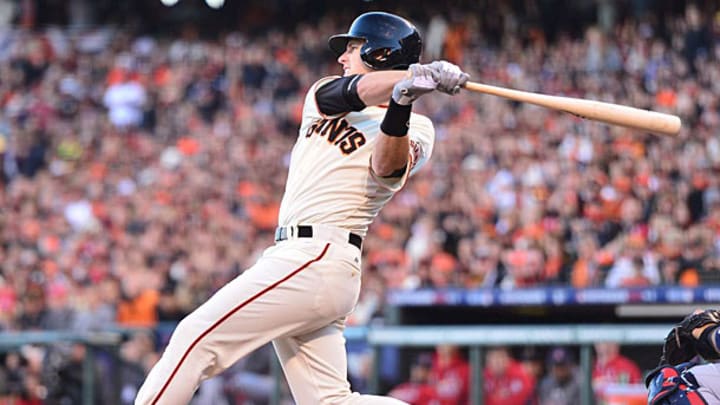Giants want to lock up Buster Posey, but what's he worth?

In his first three seasons, Buster Posey has won a Rookie of the Year, an MVP and two World Series titles. (Robert Beck/SI)

By Cliff Corcoran
Buster Posey and the Giants have begun talks that could lead to a “mega deal” contract, per a report by CBSSports.com’s Jon Heyman. At the very least, the Giants want to buy out Posey’s three remaining arbitration years after awarding him a record first-year settlement of $8 million in January, but the larger goal is a contract that would cover the bulk of Posey’s career, ensuring that he’d spend all of his best seasons in San Francisco.
So what would such a deal look like? The obvious comparison is Joe Mauer’s eight-year, $184 million extension signed with the Twins before the 2010 season, which still stands as the biggest contract ever given to a catcher. The runners-up are the seven-year, $91 million contract the Mets gave to Mike Piazza prior to the 1999 season and the five-year, $75 million deal Yadier Molina agreed to with the Cardinals a year ago.
It’s a given that any major extension for Posey would surpass the Piazza and Molina deals. Piazza’s contract is more than a decade old and was signed when he was 30. Molina was 29 when he signed his and a career .274/.331/.377 hitter when he signed that deal. Posey, by comparison, has a .314/.380/.503 career line and will turn 26 on Wednesday.
As for Mauer, he was coming off an MVP season when he signed his record-breaking extension, which at the time was the fourth-largest contract of all time. Mauer was a year older then than Posey is now (Mauer turned 27 soon after signing his contract), but he also had a much longer track record (2,994 career plate appearances to Posey’s 1,255) and a similarly impressive .327/.408/.483 career batting line.
There’s a good argument to be made that catchers have shorter careers in general than other players due to the abuse their bodies take behind the plate and that Posey’s relative inexperience is actually an additional point in his favor relative to Mauer, who was healthy enough to appear in just 82 games in the first year of his new deal. However, the flip side of that is that it’s unclear just how valuable Posey is going to be moving forward. Posey’s MVP campaign in 2012 was just his first full major league season (he wasn’t called up until May 29 in 2010 and missed most of 2011 due to injury). In both 2010 and 2012 he hit better than .300 with a slugging percentage over .500, but is that really something the Giants can expect Posey to do on an annual basis over even just the next five years?
It seems a given Posey will regress some from his .336/.408/.549 performance last year, but will it be to something like his career line (.314/.380/.503) or will it be to something more like .280/.350/.450? The latter is still tremendously valuable for a catcher, but it’s not the sort of performance worth $20 million annually for 10 years, which is likely the sort of ballpark in which the Giants negotiations with Posey are taking place. One point in Posey’s favor is his minor league line. He hit .333/.417/.542 in the minors including .337/.421/.535 in 359 plate appearances at Triple-A, lines which greatly resemble his award-winning 2012 production.
So let’s say Posey really will maintain that career line over the bulk of his new deal. Is that performance worth the $200 million he’s likely to demand? FanGraphs has a statistic called Dollars that attempts to translate a player’s Wins Above Replacement into market value in free agency. Per Dollars, Posey’s Rookie of the Year season would have been worth $16.7 million and his MVP campaign would have been worth a whopping $36 million. Remember, Posey didn’t come up until the very end of May in 2010 and WAR is a cumulative stat, so you can pro-rate that 2010 value over the two months he missed and put him at $25 million for that season.
Now, Dollars has a reputation of overvaluing players slightly, but given those numbers, the $23 million a year Mauer is making on his deal doesn’t seem unreasonable. Give Posey that over 10 years, putting him under contract through his age-35 season, and the $230 million total value of his deal will break Mauer’s catching-contract record and put him fourth all time behind the two Alex Rodriguez contracts and Albert Pujols’ Angels deal. That might seem crazy, but the history of nine-figure contracts shows that extensions given to superstar hitters in their mid-20s tend to work out. As absurd as it seemed at the time, Alex Rodriguez played up to his $252 million deal with the Rangers and Yankees, which would have expired in 2010 had he not opted out of it three years early. Derek Jeter earned his $189 million from 2001 to 2010. Pujols’ first big contract, $100 million over seven years from 2004 to 2010, turned out to be a steal. There’s a higher risk with catchers, but Posey’s bat would play at first base, a position at which he already has ample experience. What’s more, he’s already learned his lesson about avoiding collisions at home plate, and he has a lean, average-sized build which makes one optimistic about the ability of his legs and knees to hold up to a decade of squatting.
